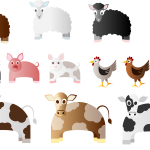In January, the USDA published its 2024 Pesticide Data Program, covering the 2022 production period. It illustrates that more than 99 percent of the 8,512 fruits and vegetables sampled had residues below the established EPA tolerances. And 27.6 percent had no detectable residue.
Food & Nutrition
Like all natural health matchstick men, Josh Axe is a supplement hustler and champion of bad nutritional advice. On Episode 61 of the Science Dispatch podcast, hosts Cameron English and Dr. Chuck Dinerstein sit down with ACSH contributor Katie Suleta to examine one of Axe's latest cons: a six-step "liver cleanse."
The magic of comfort food lies in its ability to nourish both body and soul. While few argue that it enriches one’s soul, providing solace and comfort, some believe that improvements can be made in bodily nourishment.
In this radio discussion with John Batchelor, we delve into the genetic engineering of food using molecular techniques. I share insights into the current discourse surrounding genetic modification techniques and related concepts like "sustainable intensification" and "agroecology."
The American Academy of Pediatrics continues to wreck its reputation by taking ideological, unscientific stances on important public health issues. Its latest faux pas: a fatuous report attacking crop biotechnology and pesticides.
Just as the sun rises and sets, it's inevitable that the New Year comes with resolutions to be more active and to finally lose those pounds, holiday or otherwise. This year, social media is talking about "sequential meals" – the “natural” form of semaglutide (i.e., Wegovy).
Food loss and waste is a global concern. 30 to 40% of our annual production, 80 billion pounds of food, are wasted annually, or, in more human terms, 242 pounds per person. 22% of our landfills are filled with wasted food. A new study examines the intersection of environmental concerns and meat-related food loss.
This past week, Harvard’s T.H. Chan School of Public Health hosted a webinar on the putative dangers of ultra-processed foods (UPF). Let me share my recap.
The blockbuster weight-loss drugs Wegovy and Ozempic have helped many patients rapidly slim down. But these powerful pharmaceuticals could have unintended consequences we may not be ready for. Meanwhile, what motivates people to wear masks? Post COVID, researchers are finally beginning to find some answers.
This past month, Stanford Medicine posted the following press release headline: “A Stanford Medicine-led trial of identical twins comparing vegan and omnivore diets found that a vegan diet improves overall cardiovascular health.”
Walk down the baby food aisle in your supermarket, and you'll surely run into the “Toddler Milk” display. Every parent or grandparent wants the best for their child, and a product specially geared to a toddler's needs seems enticing. Don’t be fooled.
The weight loss drugs Wegovy and Ozempic portend a massive impact on the “obesity epidemic.” Users may even be able to get insurance coverage, as the FDA just approved a third drug specifically for weight loss treatment, signaling greater coverage for all drugs in the class. Sounds promising, right? But, alas, there are unintended consequences.











